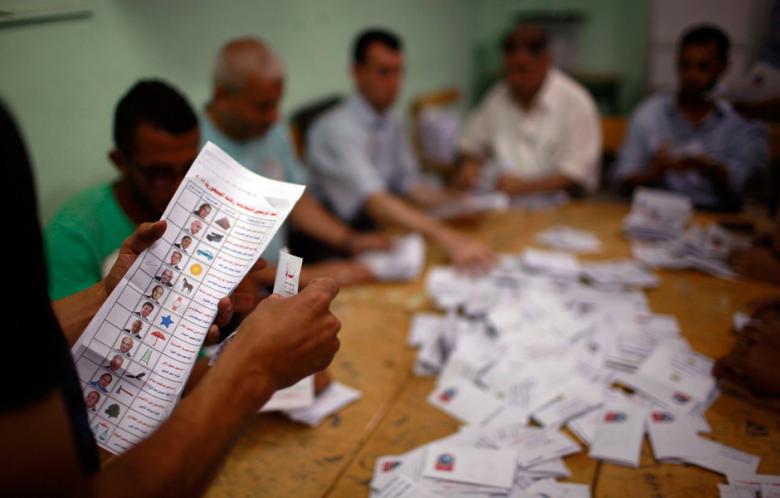Alexandria—When Mohamed ElBaradei visited Mansoura earlier this month, he must have taken into consideration that Egypt’s 29-year-old emergency law could be used to disrupt his first tour outside the capital. His visit to the Nile Delta’s most populous city was nevertheless peaceful despite the 1500 plus people who gathered to cheer him outside el-Nour mosque where he participated in Friday prayers.
Instead, ElBaradei, who is emerging as Egypt’s most serious challenger to President Hosni Mubarak, was dealt a blow from a rather unconventional direction: Salafis, followers of a strict Sunni Islamic movement that takes the pious ancestors, or “Salaf”, of early Islam as exemplary models, and preaches strict adherence to the Quran and the sayings and deeds of Prophet Mohamed and his companions.
Sheikh Ahmed el-Naqib, one of Mansoura’s influential Salafi dignitaries, slammed ElBaradei in his sermon.
“Elbaradei is an American stooge who has been trying to appeal to Christians [in Egypt],” Naqib told his followers in Mansoura. Dubbing him “as bad as others”–a clear allusion to Mubarak–the preacher said that ElBaradei “has stated that [religious] extremism is the single most serious obstacle to the nations’ progress”–a remark the sheikh knew would provoke resentment among his audience.
In Alexandria, prominent Salafi clerics went further, calling the 67-year-old reformist a greater evil than the current regime.
In a sermon titled “The National Association for Change” (the same name as ElBaradei’s pro-reform coalition), Sheikh Saeed Abdel Azim condemned the former diplomat on the grounds that he had, allegedly, called for abolishing the second article of Egypt’s Constitution which stipulates that “Islam is the religion of the state and Islamic jurisprudence is the principal source of legislation.”
Political change, according to Abdel Azim’s sermon, must take place “in accordance with Islamic law,” rendering ElBaradei’s possible presidential candidacy as “a step from bad to worse, from the corrupt to the more corrupt.”
An alignment between the Mubarak regime and the Salafis against ElBaradei is considered by many as a potential tactical maneuver to delegitimize the pro-change leader in a country where ultraconservative interpretations of Islam have been increasing in recent years.
George Ishaq, one of the founders of the Egyptian Movement for Change (Kefaya) and a close aide to ElBaradei, said a group of Salafis attacked an assembly of ElBaradei supporters in the city of Fayoum last month.
“Salafis beat our supporters with sticks and prevented our gathering,” Ishaq told Al-Masry Al-Youm.
Gamila Ismail, vice president of the liberal Ghad Party, went further, suggesting a backdoor deal between security forces and Salafis to counter secular opposition groups.
“Salafis as well as former radical Islamist militants who were released from prisons have been coordinating their efforts to combat the opposition,” Ismail said.
Many political analysts, on the other hand, downplay the possibility of a strategic alliance between Salafi groups and the ruling regime, arguing that such a move would provide opportunities for Salafis to organize and gain ground, which is not desired by the government.
“Any understanding between the state and Salafis would be reached on micro levels because the regime is very well aware that Salafis consider it to be illegitimate,” said Diaa Rashwan, an expert of Political Islam at Al-Ahram Center for Political and Strategic Studies.
Many experts believe that Salafi opposition to ElBaradei is genuine.
“Democracy is not an issue for Salafis,” said Ashraf el-Sherif, a political science lecturer at the American University in Cairo. “It’s only natural to believe that they would reject ElBaradei’s calls as he has not clearly stated that he adheres to their understanding of Islamic sharia [law].”
Salafism is not a new phenomenon in Egypt’s modern history. Salafi thoughts can be traced back to 19th Century thinkers such as Jamal al-Din al-Afghani and Muhammad Abduh who called for an Islamic Renaissance. Most notably, Rashid Rida (1865-1935) stands out as the father of modern Salafism in Egypt with his emphasis on ridding Islam of all impurities and Western influences and his scrupulous adherence to religious textualism.
Although early Salafi preachers were politically driven, especially with their emphasis on rejuvenating the Islamic Caliphate, mainstream Salafism has grown more apolitical, especially since the foundation of the Muslim Brotherhood in 1928.
Older Salafi organizations such as el-Gamiyya el-Shariyyah (established in 1913) and Gamiyyat Ansar al-Sunna (established in 1926) have focused instead on battling bidah, or innovation, in the Islamic creed, such as venerating the shrines of Sufi saints.
Contemporary Salafi movements have largely abstained from politics for various, and sometimes conflicting, reasons. Adopting a dominant rationale within Saudi Wahhabism, some Salafi groups preach obedience to the ruler, whether just or unjust, prohibiting any kind of revolt. Others take a more subtle approach, preferring to shun politics for fear of compromising their principles.
Sheikh Abdel Azim puts it strategically: “I’m not against political participation per se, but rather I am adopting a similar stance, like ElBaradei, who said that he won’t run for president before certain conditions are met first, as he knew that otherwise he would be co-opted into the political game.” ElBaradei stated he would only run for president if constitutional impediments to independent candidacy are removed.
Salafis interpret compromising religion as including an array of issues, of which democratic rule is the most striking.
“Democracy is not just a set of political procedures, but rather an ideology,” Abdel Azim told Al-Masry Al-Youm during an interview in his small apartment in the Sidi Bishr district of Alexandria.
For Abdel Azim, democratic rule is defined by the will of the majority, which might approve legislation that violates Islamic Law. “How could we accept giving rights to homosexuals and infidels?” Abdel Azim asked.
Last year, Abdel Azim caused a controversy within Islamic circles when he described as “irrelevant” speculations that Mubarak is grooming his younger son, Gamal, to succeed him.
Abdel Azim’s remarks were viewed as laying the ground for a possible accord with the ruling regime, an interpretation which he utterly rejected.
“I only stated the obvious about Islam’s ordinance,” Abdel Azim said. “Hereditary rule has been known throughout Islam’s history,” he added.
The 57-year-old sheikh noted that his remarks have neither brought any gains to the Salafi movement, nor to him personally. He is still banned from leaving Alexandria, or appearing on television shows on any of the many Salafi satellite channels licensed in Egypt since 2006, such as el-Nass and el-Rahma.
In Alexandria, dubbed by many as a Salafi stronghold, the relationship between the state and Salafis has been complex. While they enjoy relative freedom to organize religious sessions in mosques, mainly in lower middle class areas, they are barred from more structured mobilization, such as establishing religious institutes or charity organizations.
In 1994, local authorities shut down al-Furqan Institute, which was founded by clerics to teach Salafism in a more systematic manner. Collection of zakat, or Islamic almsgiving, and other kinds of financial support for the poor were also restricted by authorities during the 1990s.
During Israel’s war on the Gaza Strip last year, Egyptian authorities shut down Sheikh Yasser Borhamy’s website (salafvoice.com) for a week. Borhamy, an authoritative Salafi preacher in Alexandria, was perceived to be critical of Cairo’s role in the Israeli assault against the Islamic Hamas movement that controls the Strip.
One of Borhamy’s acolytes, who preferred to remain anonymous for fear of reprisal by security forces, said the only reason authorities would not ban all Salafi websites is that the websites allow authorities to monitor the pulse of the Salafi community.
“Keeping us public provides them with an idea about how we tackle different issues,” Borhamy’s student said.
He added that the opportunity to be employed in a state-owned company will be highly diminished if a person is suspected as being a Salafi, particularly in the most lucrative sectors like petroleum and telecommunications.
Salafism’s goal of fixing the individual Muslim’s beliefs and morality could however account for the state’s reasonable tolerance of the movement. With Egypt’s moving steadily into an open market system, Salafi doctrine could help preserve the social fabric and limit people’s expression of their economic grievances.
“Salafi discourse entails social disciplinary functions whereby the wrath of the disenfranchised classes is directed through certain channels and your misery will be compensated in the afterlife,” said el-Sherif.
While politically quietist for the time being, Salafis could resort to a more active role than just transforming the individual, following the course of Salafi groups in Kuwait, Bahrain and Yemen.
“Like all other forces within Egypt’s society, future Salafis’ political participation will depend on a cost-benefit analysis,” el-Sherif said. “If they feel that the regime’s grip on political life is eroding, then we could expect a more active political role, otherwise if things remain the same they will keep their opposition in the ideological sphere.”
But without clear organizational structures among the rank and file, it is hard to believe that the political message of Salafi preachers could automatically translate into political action.
“We want to be part of the change that is sweeping the country,” said Sherif Ahmed, 24, a self-described Salafi. “Many of us are considering joining ElBaradei’s movement to help put an end to despotism and corruption.”
This is the first in a two-part series on Salafis by Saif Nasrawi and the first installment of Al-Masry Al-Youm’s ongoing series on political Islam in Egypt. A new installment will come out next week.




